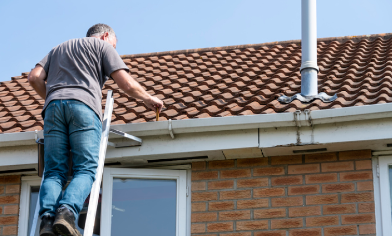Buildings Insurance
There’s a lot that can happen to a building and not all of it is visible to the naked eye. The house you live in is there to protect you and keep you comfortable and safe. Cover it against damage with buildings insurance.
It might be uncomfortable to think about but the damage that subsidence, a flood, a fire or even a slow water leak can do to a building can be devastating*. Buildings Insurance is there to make sure that if these events occur – whether minor or serious – you have help and protection.
*Subsidence, flood and escape of water all have a higher compulsory excess that is payable in the event of a claim
Buildings Insurance looks after the bricks-and-mortar element of your home. That’s the physical structure of the building or anything you couldn’t remove without significant effort or changing the features of the property.
Walls
Doors
Windows
Roofs
Floors
Fitted kitchens/bathroom suites
We offer two different cover levels to suit your needs: Silver and Gold. For full details of what is and isn’t covered read our policy booklet. For more information read our Home Insurance policy terms and conditions.
|
Cover features |
Silver |
Gold |
|---|---|---|
|
Insurance Product Information Document (IPID) |
Silver |
Gold |
|
Buildings sum insured The maximum amount you can claim for |
Silver Up to £1,000,000 |
Gold Up to £1,000,000 |
|
Rent and alternative accommodation Cost of somewhere to stay if your home can’t be lived in |
Silver Up to £200,000 |
Gold Unlimited |
|
Additional accidental damage Cover for unexpected and unintended damage caused by something sudden and not deliberate |
Silver Not included. Available as an optional add-on to your policy |
Gold Included |
|
Replacement locks and keys Covering the cost of locksmith charges or replacement keys if they’re lost, stolen or damaged |
Silver Up to £1,000 |
Gold Up to buildings sum insured |
|
Acquired disability If you become permanently physically disabled during your policy, we cover changes to your home |
Silver Not included |
Gold Up to £10,000 |
|
Trace and access Finding and fixing the source of a leak can disrupt a lot of your house, but we'll cover the cost |
Silver Up to £5,000 |
Gold Up to buildings sum insured |
Whatever stage you’re at in life, protecting what matters most to you is a must. Perhaps you’ve just bought your first house. Or you’re packing up to move into a student flat. It’s important to protect what’s yours.
You’d only ever need to have buildings insurance if you own (or are planning to own) a property and you’re looking to protect it. This includes part ownership schemes such as Help to Buy. If you are renting a property, you do not need buildings insurance.
There isn’t a legal obligation for homeowners to have buildings insurance, but mortgage lenders may make buildings insurance a condition of lending you money. It is also a good idea in its own right, as without buildings insurance, anything that happens to your house would have to be paid out of your own pocket. And, while it’s not nice to think about, this could potentially include the cost of a rebuild – something that is out of most people’s means.
Typically, buying a flat involves becoming part of a business or group of leaseholders who collectively own the building. Alternatively a management company might look after the administration of the building, including the buildings insurance.
Depending on the nature of the building as a whole, you may be able to decide with the other leaseholders which insurer to use and what the policy covers. However, in bigger buildings, it’s likely that the business that owns the property as a whole will arrange the buildings cover and you will contribute to the overall monthly premium.
This won’t be the same for everyone, and so it’s important you understand from the owners of the building as a whole whether your property is covered on a catch-all buildings insurance policy.
This type of arrangement is unlikely to extend to contents insurance, which will be up to you to arrange.
Whatever the age or type of property you live in, if you own it, you will need to get buildings insurance if you want it to be protected.
This is the case for part-ownership schemes as well, like Help to Buy. Any time that you engage a mortgage lender to become a homeowner, you are very likely to need to have buildings insurance in order to qualify.
New-builds by their nature have not been lived in before, so you may encounter problems that couldn’t have been foreseen. This is one reason why buildings insurance can be important.
By its nature, buildings cover doesn’t cover contents.
Accidental damage – ie damage that you or someone in your house does to your property unintentionally – is not covered as standard and can be purchased as an add-on for Silver policies. With Gold policies, Accidental Damage comes as standard.
Some elements of wear and tear, like pipes that burst due to age and natural corrosion, may not be covered as standard. It’s important if you live in an old property to make sure that you are covered for things that could go wrong as a result of the property’s age.
There may be other exclusions that are due to your personal circumstances (for instance, if you or someone in your property smokes), so answer everything accurately when getting a quote to get the most representative figure.
Check your Insurance Product Information Document (IPID) or policy summary for details to ensure the policy suits your needs.
No. Your policy does not cover for anything that happens gradually. This includes damage to electrical and domestic appliances caused by them breaking down.
Home maintenance is important and it is your responsibility to look after your building and contents. Your policy is designed to only cover you for things that you couldn’t have reasonably predicted.
If you’ve had a survey done there may be items on it that we’ll ask about in the quote journey. So it can be helpful to have your survey results to hand. We’ll also need to know if you’ve done, are doing or plan to do any significant renovation or building work.
An excess on any insurance policy is an amount you will need to pay when you make a claim. There are two kinds of excess: voluntary and compulsory. Voluntary excess is an amount you choose to pay while a compulsory excess is one that you have to pay if you want to make a claim. The total excess in the event of a claim will be the combination of the two.
Your excess may be taken from your insurance claim payout. For instance, if you have an excess of £1,000 and make a claim for £5,000, your insurer may retain £1,000 of the payout and give you £4,000.
Accidental Damage is an extra level of home insurance cover and separate from damage included on your main policy. Your policy will already cover you for damage caused by a storm, fire, flood or theft and attempted theft.
Accidental damage is sudden, unexpected harm done to your building or contents unintentionally. It is damage done by you or someone in your house. This could be accidentally drilling through a pipe when doing DIY, for instance. Or, in the case of contents insurance, it could be knocking a glass of red wine onto a carpet.
You’ll need to purchase Accidental Damage cover at the same time you buy your policy – it can’t be added on later. Only you can decide if you want or need Accidental Damage cover. Accidental Damage comes as standard with our Gold product.
It means that your policy will renew automatically when your policy comes up for renewal next year. It’s a convenient, stress-free way of staying insured. We’ll send a reminder 24 days before your renewal date so you can check the details, and make sure you are still happy to go ahead.
Please look at your policy summary as the information on this document is specific to you. It includes your personal and property details, the cover you have purchased, the cost of your insurance, your chosen method of payment, any excesses applicable and if you are set up to auto renew, or not.
You can update your auto renew preference in a number of ways. You can call our contact centre on 03334 439 850 or go onto the Self Service Centre. You can email homeinsurance@postoffice.co.uk. Or write to Post Office Insurance Services, 67 Hope Street, Glasgow G2 6AE. Please be ready to quote your home insurance policy number which begins with an H followed by digits.
If you choose to pay by monthly instalments, you will be charged for the credit, and this is indicated by the (variable) APR%. Premium Credit Limited (PCL) may also charge a £5 facility fee which covers their ongoing regulatory operating costs of affordability and anti-money laundering checks. This means you pay more for a monthly payment plan than you would for an annual lump sum arrangement.
PCL are a third-party finance provider, appointed by Post Office Insurance to provide credit to our customers who’d like to pay monthly by direct debit for their home insurance. You can contact PCL on 03447 369 820.
*Calls to 03 numbers will cost no more than calling a standard geographic number starting with 01 or 02 from your fixed line or mobile and may be included in your call package dependent on your service provider. Calls may be monitored or recorded for training and compliance purposes.

Japanese knotweed, dry rot and your home insurance
Japanese knotweed and dry rot can be major problems for homeowners in the UK. Even though they can cause significant damage to your property, they’re usually not covered ...

Moving home checklist
You've found your dream home, exchanged contracts and sorted your mortgage or rent. All that's left to do is move in. That’s the easy part, isn’t it?

7 issues that can affect your home. Is my home insured?
Home insurance is a way to protect your property and its contents in case they're damaged or lost. But it can be hard to know what it will cover.

Home security tips: how to make your home more secure
Good home security can help keep your family and belongings safe. It may also help you save money on your home insurance, depending on the steps you take to protect your ...

How clearing your gutters impacts your home insurance
Keeping your gutters in good working order is part of home maintenance and reduces the risk of having a building claim declined on the basis of wear and tear. If you ...

Accidental Damage Home Insurance
What it is, why you might need it and when you might need extra
Post Office Management Services Limited is authorised and regulated by the Financial Conduct Authority, and is registered in England and Wales. Our financial services registered number is 630318. The registered office for Post Office Management Services Limited is 100 Wood Street, London, EC2V 7ER. Our Registered Number is 08459718.